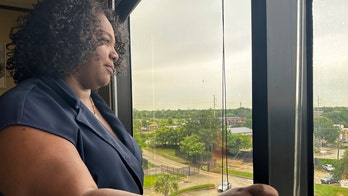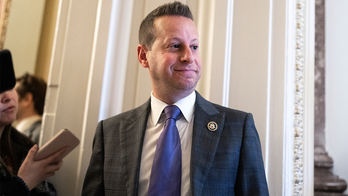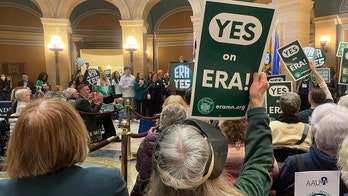As Republicans head to the polls in three states for the latest iteration in the presidential primary, Mitt Romney is banking his delegates on a methodical push to the top. And he says he's not buying the hype he can't wrap up the deal even as his rivals try to set up roadblocks.
"We're closing the deal, state-by-state, delegate-by-delegate," Romney said Monday, noting that he has two and a half times as many delegates as Rick Santorum and an even wider lead over Newt Gingrich.
Three states -- Mississippi, Alabama and Hawaii -- vote on Tuesday, offering a collective 101 delegates to the candidates on their path to 1,144 -- the magic number needed to win the nomination.
So far, Romney is keeping a wide lead overall -- garnering 454 delegates, nearly 40 percent of the total he needs to secure the nomination. That's compared to 217 delegates for Santorum, 107 for Gingrich and 47 for Ron Paul, according to The Associated Press tally used by most news agencies.
With 2,286 total delegates, Romney would need about 48 percent of the remaining vote to secure the nomination. That compares to Santorum, who would need about 63 percent of the vote while Gingrich would have to collect 71 percent of the remainder to get the nomination.
But Romney's opponents, hoping for a game changer as they move toward the later contests, including the very red states of Mississippi and Alabama, say there's no mathematical guarantee Romney walks away with it.
After a decisive 30-point margin victory in Kansas over the weekend, Santorum said Monday the primary contests are now moving to states in which Romney has less of a home field or other built-in advantage.
He added that if he can divert Romney's path, he would get the nomination at a brokered convention because undecided delegates at the party's August gathering in Tampa will not nominate Romney.
"This is a conservative party. The establishment is trying to force a moderate Republican from Massachusetts down the throats of the American people, and if we have to go to a convention, we'll win a convention," Santorum said Monday.
On Sunday, Gingrich also questioned Romney's ability to perform in the southern states.
"The most he's going to get in Mississippi and Alabama is probably a third and more likely to get 25 percent or 28 percent," Gingrich told "Fox News Sunday." "So, yes, he is a front-runner. He's not a very strong front-runner. Almost all conservatives are opposed, which is the base of the party."
"If I'm a weak front-runnner what does that make Newt Gingrich because I'm well ahead of him?" Romney responded Monday.
According to polling out Monday by American Research Group, Romney is statistically tied with Gingrich in Mississippi, 34-32 percent. Santorum has 22 percent and Paul has 8 percent among the 600 likely GOP primary voters surveyed on the weekend.
In Alabama, Gingrich leads Romney 34-31 percent in the ARG poll with Santorum at 24 percent and Paul with 6 percent among the same size sample.
Romney said exit polls in the states he won -- Florida, New Hampshire, Michigan, Arizona and others -- show the base does support him.
"These were places conservatives were asked after the race who they voted for and I won commandingly in those states among conservatives," Romney said.
"It's funny to listen to these guys," he added. "They're saying what they wish were the case but what happens not to be the case. ... I don't begrudge them the fact that they're out there campaigning, working hard getting some support but ultimately I believe I'm going to be the nominee."
Romney said even if one of his two main challengers drops out -- a proposition both Santorum and Gingrich have posed to one another -- he'll pick up some of their votes on the way to the nomination.
"As you know, delegates are awarded proportionally so that lengthens the process, but we're winning this," he said.





